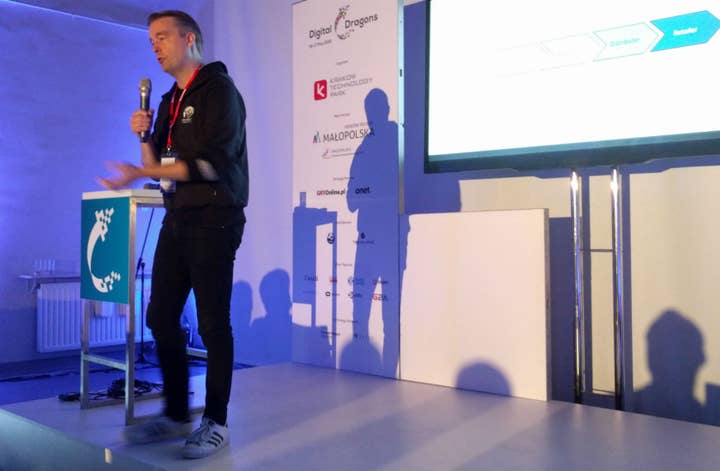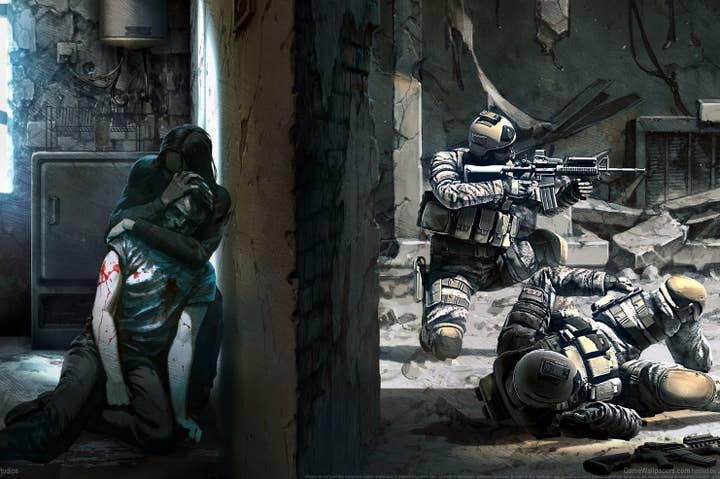Exploring the "positive tension" between creativity and marketing
For Paradox Interactive and 11 Bit Studios, the best solution to "communication clutter" is to make games worth talking about
In their talks at the Digital Dragons conference in Poland last week, Paradox Interactive's Fredrik Wester and 11 Bit Studios' Patryk Grzeszczuk laid out compelling cases for marketing and design to be seen not as two separate disciplines, but a single harmonious process. At a time when communication is more open, fluid and democratic than ever before, what a game is and how it builds an audience should be treated as one and the same.
Grzeszczuk, who worked on the marketing team for the breakout hit This War of Mine, opened his talk with a frank appraisal of the way that many people on the development side of the industry regard his profession. Marketing, he said, is often seen as a "necessary evil," but this is a perception that smaller companies, in particular, can ill afford to hold on to.
"Games are products, and they have to compete as products in a very competitive market," he said. "It's a challenge that we have to face every day... I understand [the perception] to some degree - especially after seeing the latest Call of Duty trailer - but still, you have to work with and cope with that evil, because we are more and more necessary due to the communication clutter in the market.
"We invited people to care not only about our game, but about the idea itself. The results were more than satisfying"
"There is no one recipe for how to be successful, but there is one approach that is true every freakin' time: work as closely as possible with your marketing team. There is a positive tension between creators and suits, and that positive tension can give you huge advantages in the market."
Grzeszczuk suggested that many games struggle due to not taking advantage of that "positive tension." Too many games lack distinctive characteristics, and the people that make them seem unprepared to discuss their ideas in a concise and appealing way. "I've seen many interesting games here but, to be honest, almost nobody could convince me in a short conversation that their game is about something," he said. "I could see it, but the creator of the game couldn't simplify it for me."
The aversion that many developers have to marketing is rooted in the view that the creation of the game should be a separate, discrete process. For Grzeszczuk, that view is too dismissive, and This War of Mine provides the perfect counter-argument. A harrowing game about the impact of war on normal people, it would be easy to assume that the input of a marketing team would place its admirable creative goals under threat. However, Grzeszczuk reminded the audience that 11 Bit Studios had a small budget and a limited track record - "nothing very significant that could establish us as a game developer that can provide consumers with something great."
What a game like This War of Mine offers a marketing team with limited resources is something to work with beyond, "putting one ball onto another ball to create a line and get a high score... We knew our USP right from the start. It's not important if This War of Mine is a puzzle platformer, or a walking simulator, or a real-time strategy. It's about casualties of war. Nobody cares about the mechanics or the systems. They care about the emotions and the experience."
That statement might provoke a reaction from a developer honing a core mechanic to near perfection, but Grzeszczuk is highlighting an important truth. Almost every single game is just one in a genre filled with hundreds (if not thousands) of alternatives, so both developers and marketers want exactly the same thing: to stand out, to get people talking. The bolder and braver the idea, the better the result. Gone Home, Papers Please, 1979: The Revolution, Cart Life; all are examples of successful games that use familiar mechanical structures to tell unique stories, both personal and political.
"What we figured out is that we aren't as good at explaining our own games as the people that play our games"
"We knew our game's values and its unique features, and we used those values and features as the foundation for our communications," Grzeszczuk continued. "We stood in opposition to current trends. Every game before This War of Mine tried to show that you have to be a soldier in a conflict, that you have to shoot people, and all those potentially exciting things. We had the idea that, in war, not everyone is a soldier, and we used that to create new ways of approaching our trailers and spots, and to spark a discussion on social media and in the wider media. We invited people to care not only about our game, but about the idea itself. The results were more than satisfying."
As a part of that "wider media," I can personally attest to the uniformity of so many games created by the legion of indie developers working in the industry today. Covering every single product released on a given week is impossible, so when something like This War of Mine emerges, critics and journalists fall over themselves to find out more. As Grzeszczuk points out, they are attracted not by the fact that it's a puzzle-platformer, but by the fact that its content is so much more powerful and interesting than that genre classification would suggest.
Grzeszczuk referred to the way that This War of Mine's core themes "started a conversation" on social media, one that allowed a community to come together and grow of its own volition. In his talk the following day, Paradox Interactive CEO Fredrik Wester raised a similar point, drawing a line between the company's approach to the content of its products, and the way those products sell themselves after launch. If there is an opportunity to let your community help to sell the game for you, he said, seize it with both hands.

For example, Wester discussed the value of providing players with robust modding tools from the very first day, where many developers might add that feature months after launch. "Cities: Skylines had 1,200 mods 24 hours after the game was released," he said. "All of a sudden, the value of the game was 20 per cent higher than it was the day before. 24 hours after the release of Stellaris, the first Warhammer 40,000 mod was out there. Talk about adding value. Now we're just waiting for the cease and desist letters."
"We just give people the tools... Give your players the freedom to be creative and they'll add value"
YouTube is an essential platform for this kind of value creation, so Paradox publishes the kind of games that respond well to being poked and prodded their communities. "We make very complex, very deep strategy games," he said. "What we figured out is that we aren't as good at explaining our own games as the people that play our games... That explains a lot about how a modern value chain works, where people know your game better than you know it yourself. They will use it ways you never thought possible."
Wester mentioned one example from Cities: Skylines. Paradox had invested time and money into creating promotional videos that would showcase its beautiful visuals and abundant features. "All of a sudden, some random guy on YouTube creates a box around all the sewage in his city, collecting all this poop in a crater above it. Then he removes the walls from this crater, and he drowns everyone in the city - and he adds Grieg's In the Hall of the Mountain King as the background song.
"He gets 500,000 views, but we're still happy. We could never create value in that way, because we weren't thinking in that way. We just give people the tools... Give your players the freedom to be creative and they'll add value."
GamesIndustry.biz is a media partner for the Digital Dragons conference. Our travel and accommodation costs were provided by the organiser.










